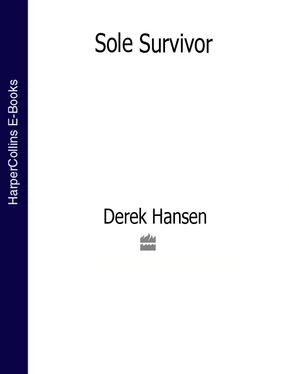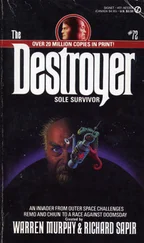Sole Survivor

DEREK HANSEN

Copyright
This novel is a work of fiction. The names, characters and incidents portrayed in it are the work of the author’s imagination. Any resemblance to actual persons, living or dead, is entirely coincidental.
HarperCollins Publishers Ltd.
1 London Bridge Street
London SE1 9GF
www.harpercollins.co.uk
Copyright © Derek Hansen 1997
Derek Hansen asserts the moral right to be identified as the author of this work
A catalogue record for this book is available from the British Library
All rights reserved under International and Pan-American Copyright Conventions. By payment of the required fees, you have been granted the non-exclusive, non-transferable right to access and read the text of this e-book on screen. No part of this text may be reproduced, transmitted, down-loaded, decompiled, reverse engineered, or stored in or introduced into any information storage and retrieval system, in any form or by any means, whether electronic or mechanical, now known or hereinafter invented, without the express written permission of HarperCollins ebooks
HarperCollins Publishers has made every reasonable effort to ensure that any picture content and written content in this ebook has been included or removed in accordance with the contractual and technological constraints in operation at the time of publication
Source ISBN: 9780006512684
Ebook Edition © NOVEMBER 2016 ISBN: 9780008228453
Version: 2017-01-03
Contents
Cover
Title Page
Copyright
Book One
One
Two
Three
Four
Five
Six
Seven
Eight
Nine
Book Two
Ten
Eleven
Twelve
Thirteen
Fourteen
Fifleen
Sixteen
Seventeen
Eighteen
Book Three
Nineteen
Twenty
Twenty-one
Twenty-two
Twenty-three
Twenty-four
Twenty-five
Twenty-six
Twenty-seven
Twenty-eight
Twenty-nine
Thirty
Thirty-one
Thirty-two
Book Four
Thirty-three
Thirty-four
Thirty-five
Thirty-six
Thirty-seven
Thirty-eight
Thirty-nine
Forty
Forty-one
Forty-two
Forty-three
Forty-four
Forty-five
Postscript
About the Author
Other Books By
About the Publisher
BOOK ONE
One
R ed O’Hara woke at first light convinced that he should be dead and ashamed that he wasn’t. There was nothing unusual about this. Every day began the same way. He pushed aside his mosquito net and glanced quickly around the bare wooden slat walls of his bedroom. He needed to confirm that he was safe in his bedroom and not back in hell. He rose and walked to the window to begin another day of discipline and routine, to realize the objective the doctors had insisted he set himself.
“Progress will only come through setting objectives and achieving them,” they’d said smugly, cleverly transferring the blame for their own lack of progress onto him. One day Red had surprised them by obliging. He wrote a single word in large childish letters and taped the sheet of paper to the wall above his bed.
“Survive,” was all it said.
His doctors had encouraged him to write more but in the end had to make do with what they’d got. They didn’t think survival was much of an objective, but to Red it had seemed like an insurmountable mountain. They thought survival was the means to an end. Red thought it was the means of avoiding one.
The window had no curtains. The bush and isolation guaranteed Red’s privacy. Barely two hundred people lived on the whole of Great Barrier Island, and only three were sufficiently antisocial to live on the northern end in the wilds around Wreck Bay. Both his neighbors kept their distance.
The sun was still well short of the horizon as Red slipped into his routine. Exercise, breakfast, housework, shower. Only then could he face up to the other duties his survival demanded. He allowed himself a few moments of deep breathing to calm his mind before easing slowly into his stretches. Anyone watching would have been thoroughly perplexed. His movements were fluid and graceful, but almost impossibly slow and stylized. The early light revealed a body without an ounce of fat on it. But if his ribs were clearly defined so were his muscles, and what they lacked in mass they more than made up for in tone. Red lived a hard, spartan life and it showed.
He finished his exercises yet still made no move to dress. His skin was tanned, leathery and desensitized from years of exposure to sun and the elements. Red was forty-four years old with the body of a younger man and the skin of one years older. The sun had bleached his Celtic red hair and beard so that they turned gingery at the tips. He wore both long but never untidily. Regulations had been unequivocal about that. His eyes were his most remarkable feature, and not just because they were unnaturally bright. The whites dazzled like retouched teeth on toothpaste posters, and the irises had the green hue of a troubled sea. They were the eyes of a great seducer, though Red showed not the slightest inclination to use them that way. Only rarely did anyone feel their intensity.
Breakfast was fish rice, and that rarely varied either. Red’s kitchen typified the man. Everything was in its place and spotless. His pots and pans hung on meat hooks from a rail above his wood-fueled castiron stove. The old Shacklock with its water cistern had been freshly scrubbed, and the green and cream enamel gleamed. He used it nine months of the year to cook his meals, heat his water and warm his home, a cottage little bigger than a holiday bach. He never used the Shacklock in summer, when it sat cold and idle. Instead, he lit both rings on his propane stove, put on the kettle for a cup of tea and a pot for his rice. He opened the door of his fridge, grabbed a jug of powdered milk, a bowl of fish stock in which to boil his rice, and a small steamed snapper. He closed the door quickly to keep in the cold. Once the rice was on, he broke the steamed snapper into small pieces, laid it in a bamboo steamer and placed it over the simmering rice to warm through. Archie sat on his rug beside the cold stove and whined in anticipation. There was a strong chance that no one else in the whole of New Zealand sat down to a breakfast remotely like this.
While the rice cooked, Red had another ritual to perform. He opened his screen door and walked along the veranda to the end railing, where the hill sloped abruptly away to the sea and not even his grandfather kauri tree came between him and the rising sun. Sunrise still disturbed him even though he knew he had nothing to fear. Not anymore. No Kimigayo anthem, no standing on parade, no forced labor, no beatings. Once the sun burst free from the sea he returned to the kitchen. Another day, another challenge had begun.
He divided the rice meticulously between two bowls, shared the flesh of the snapper equally, but laid the fish head on Archie’s portion. Red liked sucking out the eyes and the cheeks, but so did Archie, and it was the border collie’s turn. Red was never anything but scrupulously fair.
“Good to the grain,” his mates in the camp used to say, even though the rice they shared was often green or rotting. They liked it when Red served, and there were never any arguments or fights when he did. Red and Archie always had breakfast on the veranda except when rain or high winds made it too uncomfortable. Red ate at a table he’d fashioned from timbers salvaged from the old mine battery at Oreville, while Archie had his bowl on a square of linoleum. Fish was a delicacy neither of them tired of, though the overriding sentiment that governed Red’s appreciation was gratitude. He was grateful that there was something filling and life sustaining to put in his bowl. Anyone who’d ever been forced to go without would understand.
Читать дальше














